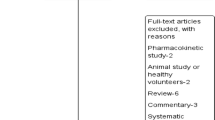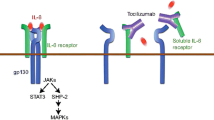Abstract
Spleen tyrosine kinase (Syk) is a cytoplasmic tyrosine kinase involved in signalling in many of the cells that drive immune inflammation. The development of small molecules that inhibit Syk kinase may change the way we treat disorders such as rheumatoid arthritis (RA), as well as a range of other inflammatory diseases.
Fostamatinib (R-788) is an orally bioavailable small molecule. It is the prodrug of R406, which is a potent Syk inhibitor. Fostamatinib was developed because it has more favourable physiochemical properties. It is rapidly converted to R406 by intestinal enterocytes. It has been evaluated in experimental models of RA, such as collagen-induced arthritis. In these models, fostamatinib suppressed clinical arthritis, bone erosions, pannus formation and synovitis.
A phase II programme with fostamatinib has largely been completed. Three key trials have been published, lasting 12–26 weeks and each enrolling 189–457 patients (875 in total). All these trials involved placebo therapy and patients continued to receive methotrexate in addition to active treatment with fostamatinib. The first dose-ranging trial evaluated three treatment doses in RA patients who had not fully responded to methotrexate therapy. The second trial compared two treatment doses in patients who had not responded to methotrexate therapy. The third trial compared a single treatment dose with placebo in patients who had not responded to biological therapy.
The primary outcome measure was the number of patients achieving American College of Rheumatology (ACR) 20% (ACR20) responses. Placebo ACR20 response rates in all three trials were similar (35–38%). All three trials involved one treatment arm receiving fostamatinib 100mg twice daily; ACR20 responses with this active treatment ranged from 38% to 67%. A meta-analysis of ACR responses in these trials, using responses to the highest dose in each trial for comparisons with placebo therapy in a random effects model, showed a borderline benefit with ACR20 responses. There were more significant differences with ACR50 and ACR70 responses. The reason that this meta-analysis was not more strongly positive is that the third trial, which evaluated patients who had failed to respond to biological treatments, gave negative results.
Individual ACR response components, such as changes in swollen joint counts, showed significant differences in the first two trials, but there were no definite treatment benefits in the third trial. Overall, the differences were significant in a meta-analysis of all three trials.
The most important adverse reactions were diarrhoea, neutropenia and raised ALT levels, which all showed significant excesses with active treatment compared with placebo. Too few patients have been studied for a definitive safety profile to be known.
Overall, the results of the phase II trials were sufficiently encouraging for a phase III programme to be initiated. It will be some years before their definitive results are available.







Similar content being viewed by others
References
Kyttaris VC, Tsokos GC. Syk kinase as a treatment target for therapy in autoimmune diseases. Clin Immunol 2007; 124: 235–7
Rivera J, Colbert RA. Healing the Syk through kinase inhibitors. N Engl J Med 2010; 363: 1362–4
Lowell CA. Src-family and Syk kinases in activating and inhibitory pathways in innate immune cells: signaling cross talk. Cold Spring Harb Perspect Biol 2011; 3(3): pii, a002352
Turner M, Schweighoffer E, Colucci F, et al. Tyrosine kinase SYK: essential functions for immunoreceptor signalling. Immunol Today 2000; 21: 148–54
Hammaker D, Firestein GS. “Go upstream, young man”: lessons learned from the p38 saga. Ann Rheum Dis 2010 Jan; 69 Suppl. 1: i77–82
Riese RJ, Krishnaswami S, Kremer J. Inhibition of JAK kinases in patients with rheumatoid arthritis: scientific rationale and clinical outcomes. Best Pract Res Clin Rheumatol 2010; 24: 513–26
Scott DL, Wolfe F, Huizinga TW. Rheumatoid arthritis. Lancet 2010; 376: 1094–108
van Oosterhout M, Bajema I, Levarht EW, et al. Differences in synovial tissue infiltrates between anti-cyclic citrullinated peptide-positive rheumatoid arthritis and anti-cyclic citrullinated peptide-negative rheumatoid arthritis. Arthritis Rheum 2008; 58: 53–60
Feldmann M, Brennan FM, Maini RN. Rheumatoid arthritis. Cell 1996; 85: 307–10
Choy EH, Isenberg DA, Garrood T, et al. Therapeutic benefit of blocking interleukin-6 activity with an antiinterleukin-6 receptor monoclonal antibody in rheumatoid arthritis: a randomized, double-blind, placebo-controlled, dose-escalation trial. Arthritis Rheum 2002; 46: 3143–50
Firestein GS, Zvaifler NJ. How important are T cells in chronic rheumatoid synovitis? II: T cell-independent mechanisms from beginning to end. Arthritis Rheum 2002; 46: 298–308
Sweeny DJ, Li W, Clough J, et al. Metabolism of fostamatinib, the oral methylene phosphate prodrug of the spleen tyrosine kinase inhibitor R406 in humans: contribution of hepatic and gut bacterial processes to the overall biotransformation. Drug Metab Dispos 2010; 38: 1166–76
Colonna L, Catalano G, Chew C, et al. Therapeutic targeting of Syk in autoimmune diabetes. J Immunol 2010; 185: 1532–43
Pine PR, Chang B, Schoettler N, et al. Inflammation and bone erosion are suppressed in models of rheumatoid arthritis following treatment with a novel Syk inhibitor. Clin Immunol 2007; 124: 244–57
National Audit Office. Services for people with rheumatoid arthritis. London: National Audit Office, 2009
Deighton C, Scott DL. Treating inflammatory arthritis early. BMJ 2010 Dec 31; 341: c7384
Choy EH, Smith CM, Farewell V, et al., CARDERA (Combination Anti-Rheumatic Drugs in Early Rheumatoid Arhritis) Trial Group. Factorial randomised controlled trial of glucocorticoids and combination disease modifying rugs in early rheumatoid arthritis. Ann Rheum Dis 2008; 67: 656–63
Donahue KE, Gartlehner G, Jonas DE, et al. Systematic review: comparative effectiveness and harms of diseasemodifying medications for rheumatoid arthritis. Ann Intern Med 2008; 148: 124–34
Ma MH, Kingsley GH, Scott DL. A systematic comparison of combination DMARD therapy and tumour necrosis inhibitor therapy with methotrexate in patients with early rheumatoid arthritis. Rheumatology 2010; 49: 91–8
Singh JA, Christensen R, Wells GA, et al. A network metaanalysis of randomized controlled trials of biologics for rheumatoid arthritis: a Cochrane overview. CMAJ 2009; 181: 787–96
Scott DL, Kingsley G. Clinical effectiveness of biologics in clinical practice. Arthritis Res Ther 2010; 12: 115
Svenson M, Geborek P, Saxne T, et al. Monitoring patients treated with anti-TNF-alpha biopharmaceuticals: assessing serum infliximab and anti-infliximab antibodies. Rheumatology 2007; 46: 1828–34
Strangfeld A, Hierse F, Kekow J, et al. Comparative effectiveness of tumour necrosis factor alpha inhibitors in combination with either methotrexate or leflunomide. Ann Rheum Dis 2009; 68: 1856–62
Weinblatt ME, Kavanaugh A, Burgos-Vargas R, et al. Treatment of rheumatoid arthritis with a Syk kinase inhibitor: a twelve-week, randomized, placebo-controlled trial. Arthritis Rheum 2008; 58: 3309–18
Weinblatt ME, Kavanaugh A, Genovese MC, et al. An oral spleen tyrosine kinase (Syk) inhibitor for rheumatoid arthritis. N Engl J Med 2010; 363: 1303–12
Genovese MC, Kavanaugh A, Weinblatt ME, et al. An oral Syk kinase inhibitor in the treatment of rheumatoid arthritis: a three-month, randomized, placebo-controlled, phase 2 study in patients with active rheumatoid arthritis that did not respond to biologic agents. Arthritis Rheum 2011; 63: 337–45
Maini RN, Breedveld FC, Kalden JR, et al. Therapeutic efficacy of multiple intravenous infusions of anti-tumor necrosis factor alpha monoclonal antibody combined with low-dose weekly methotrexate in rheumatoid arthritis. Arthritis Rheum 1998; 41: 1552–63
Smolen J, Landewé RB, Mease P, et al. Efficacy and safety of certolizumab pegol plus methotrexate in active rheumatoid arthritis: the RAPID 2 study: a randomised controlled trial. Ann Rheum Dis 2009; 68: 797–804
Keystone E, Heijde D, Mason Jr D, et al. Certolizumab pegol plus methotrexate is significantly more effective than placebo plus methotrexate in active rheumatoid arthritis: findings of a fifty-two-week, phase III, multicenter, randomized, double-blind, placebo-controlled, parallel-group study. Arthritis Rheum 2008; 58: 3319–29
Weinblatt ME, Keystone EC, Furst DE, et al. Adalimumab, a fully human anti-tumor necrosis factor alpha monoclonal antibody, for the treatment of rheumatoid arthritis in patients taking concomitant methotrexate: the ARMADA trial. Arthritis Rheum 2003; 48: 35–45
Lipsky PE, van der Heijde DM, St Clair EW, et al., Anti-Tumor Necrosis Factor Trial in Rheumatoid Arthritis with Concomitant Therapy Study Group. Infliximab and methotrexate in the treatment of rheumatoid arthritis. N Engl J Med 2000; 343: 1594–602
Weinblatt ME, Kremer JM, Bankhurst AD, et al. A trial of etanercept, a recombinant tumor necrosis factor receptor: Fc fusion protein, in patients with rheumatoid arthritis receiving methotrexate. N Engl J Med 1999; 340: 253–9
Sheridan C. Small molecule challenges dominance of TNF-alpha inhibitors. Nat Biotechnol 2008; 26: 143–4
Bajpai M, Chopra P, Dastidar SG, et al. Spleen tyrosine kinase: a novel target for therapeutic intervention of rheumatoid arthritis. Expert Opin Investig Drugs 2008; 17: 641–59
Bajpai M. Fostamatinib, a Syk inhibitor prodrug for the treatment of inflammatory diseases. IDrugs 2009; 12: 174–85
Opar A. Kinase inhibitors attract attention as oral rheumatoid arthritis drugs. Nat Rev Drug Discov 2010; 9: 257–8
Riccaboni M, Bianchi I, Petrillo P. Spleen tyrosine kinases: biology, therapeutic targets and drugs. Drug Discov Today 2010; 15: 517–30
Friedberg JW, Sharman J, Sweetenham J, et al. Inhibition of Syk with fostamatinib disodium has significant clinical activity in non-Hodgkin lymphoma and chronic lymphocytic leukemia. Blood 2010; 115: 2578–85
Acknowledgements
David L. Scott receives grant funding support from Arthritis Research UK and The National Institute for Health Research. In the past 2 years, Dr Scott has received no personal funding from any industrial sponsor. His department has not received any grants from companies involved in the development of any Syk kinase inhibitor or other small molecule being developed to treat arthritis.
Author information
Authors and Affiliations
Corresponding author
Rights and permissions
About this article
Cite this article
Scott, D.L. Role of Spleen Tyrosine Kinase Inhibitors in the Management of Rheumatoid Arthritis. Drugs 71, 1121–1132 (2011). https://doi.org/10.2165/11591480-000000000-00000
Published:
Issue Date:
DOI: https://doi.org/10.2165/11591480-000000000-00000




